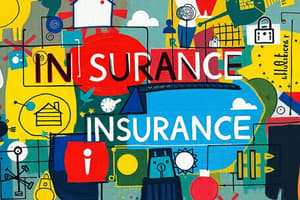Podcast
Questions and Answers
What is the primary objective of the principle of indemnity in insurance?
What is the primary objective of the principle of indemnity in insurance?
- To ensure that insurers profit from each claim process.
- To encourage insured individuals to report all losses.
- To restore insureds to their original financial position after a loss. (correct)
- To minimize the amount of premiums collected by the insurer.
Which of the following statements best defines a peril in the context of insurance?
Which of the following statements best defines a peril in the context of insurance?
- The cause of a loss, such as fire or theft. (correct)
- The total amount covered under an insurance policy.
- The financial burden caused by a loss.
- A situation that increases the chances of a loss.
Which of the following best describes the concept of moral hazard in insurance?
Which of the following best describes the concept of moral hazard in insurance?
- The financial commission that agents receive from selling policies.
- Losses arising from natural disasters such as floods or earthquakes.
- The increase in risk that occurs when individuals have insurance coverage. (correct)
- The non-compliance of insurers with regulatory standards.
What is a key regulatory requirement for insurance policies in Australia?
What is a key regulatory requirement for insurance policies in Australia?
How does the principle of utmost good faith apply to insurance contracts?
How does the principle of utmost good faith apply to insurance contracts?
What type of insurance is specifically designed to provide financial protection in the event of someone's death?
What type of insurance is specifically designed to provide financial protection in the event of someone's death?
Which of the following best describes morale hazard?
Which of the following best describes morale hazard?
What must insurers charge in premiums to remain viable in the insurance business?
What must insurers charge in premiums to remain viable in the insurance business?
What does the principle of utmost good faith require from parties involved in an insurance contract?
What does the principle of utmost good faith require from parties involved in an insurance contract?
How does moral hazard differ from morale hazard in insurance?
How does moral hazard differ from morale hazard in insurance?
Which of the following is NOT a type of insurance mentioned?
Which of the following is NOT a type of insurance mentioned?
What is the primary purpose of life insurance?
What is the primary purpose of life insurance?
Which statement about income protection policies is accurate?
Which statement about income protection policies is accurate?
What type of insurance can mitigate financial loss to a business due to the death of a key employee?
What type of insurance can mitigate financial loss to a business due to the death of a key employee?
Which of the following statements about insurance contracts is false?
Which of the following statements about insurance contracts is false?
Which type of insurance provides coverage against loss resulting from theft, fire, or burglary?
Which type of insurance provides coverage against loss resulting from theft, fire, or burglary?
What is a key characteristic of moral hazard?
What is a key characteristic of moral hazard?
Which of the following best describes a physical hazard?
Which of the following best describes a physical hazard?
Which scenario represents morale hazard?
Which scenario represents morale hazard?
Which of the following perils is not insurable?
Which of the following perils is not insurable?
What might motivate an insured individual to engage in moral hazard?
What might motivate an insured individual to engage in moral hazard?
Which of the following is an example of morale hazard?
Which of the following is an example of morale hazard?
What is the main concern regarding moral hazard for insurers?
What is the main concern regarding moral hazard for insurers?
Which one of the following perils is typically covered by property insurance?
Which one of the following perils is typically covered by property insurance?
Which of the following correctly identifies moral hazard versus morale hazard?
Which of the following correctly identifies moral hazard versus morale hazard?
Flashcards are hidden until you start studying
Study Notes
Peril
- The cause of a loss is the peril.
- For example, a fire is the peril that causes a house to burn.
- A collision is the peril that causes a car to be destroyed in an accident.
- Common perils that result in losses include fire, cyclone, storm, flood, lightning, earthquakes, malicious damage, theft, and burglary.
- Insurable events are those that can be covered by insurance.
Hazard
- A hazard increases the chance of a loss occurring.
- Hazards can be categorized into three types: physical, moral, and morale.
- Physical hazards are physical conditions that increase the chance of loss, such as defective wiring in a building.
- The hazard itself doesn't directly cause the loss; the peril (e.g., fire) does.
Moral Hazard
- Moral hazard occurs when an insured party intentionally engages in risky behavior to cause a loss, knowing they are protected against it.
- This occurs when the insurance payout exceeds the value of the insured asset, incentivizing the insured to create a loss.
- Moral hazard is related to unethical or immoral behavior, aiming to gain at the expense of insurers and other policyholders.
- This arises when both parties have incomplete information, leading to uncertainty about the insured's actions.
- Moral hazard can be difficult to mitigate and is present in various insurance types.
Moral Hazard Example
- A business overstocked with unsold inventory due to a recession may intentionally burn down their warehouse and collect insurance money.
- This scenario highlights the potential for deliberately causing a loss to benefit from insurance payouts.
- Arson is a clear example of moral hazard, but not all fires are related to insurance claims.
Morale Hazard
- Morale hazard arises due to carelessness and indifference to a loss because of the existence of insurance.
- This occurs when individuals become lax in protecting their assets due to having insurance, leading to a higher risk of loss.
Economically Feasible Insurance
- Most individuals acquire insurance only if it's economically feasible, meaning the maximum possible loss should be significant, and the premium shouldn't be excessive.
- The potential loss (e.g., destroyed car) must outweigh the cost of the premium.
- Insurers charge more than the expected value of a loss to ensure profitability, but not excessively to remain attractive to policyholders.
Insurance Policies
- Insurance policies are contracts between an insurer and an insured, outlining the terms of the coverage.
- These policies are regulated by laws, agency regulations, and court decisions.
- Under an insurance policy, the insurer compensates the insured for a specified amount of loss resulting from specific events within a defined period.
- Insurance provides financial security to cover losses or replace damaged assets.
- Covered losses arise from perils, which are influenced by hazards.
Principle of Indemnity
- The principle of indemnity aims to restore the insured to their pre-loss financial position.
- It prevents individuals from profiting from a loss event by ensuring they can only collect their actual loss.
- Thus, it helps control moral hazards and reduces the likelihood of intentionally causing a loss.
Peril and Hazard vs. Risk
- While closely related to risk, peril and hazard differ from the concept of risk.
- Peril refers to the direct cause of a loss.
- Hazard is a condition that increases the likelihood of a peril occurring.
- For example, a lack of concern for theft due to car insurance is a moral hazard.
- This hazard increases the chance of a theft (the peril) occurring.
Principle of Utmost Good Faith
- The principle of utmost good faith applies to all insurance contracts, demanding a higher standard of honesty compared to typical commercial contracts.
- This principle requires complete, accurate, and voluntary disclosure of all material facts relevant to the risk being insured, regardless of whether they are asked for or not.
- This principle sets a different interpretation for insurance agreements relative to general business contracts.
Types of Insurance
- Insurance can be categorized into different types, including:
- Life and health insurance
- Property insurance
- Public liability insurance
- Business interruption insurance
- Fire, burglary, and theft insurance
- Marine insurance
- Motor vehicle insurance
- Workers compensation insurance
Insurance Protection for Individuals
- Life insurance provides protection against income loss due to death, categorized into permanent plans and term life policies.
- Income protection policies cover income loss caused by permanent or temporary disablement.
- Both life and income protection policies often include trauma insurance as an add-on.
- Key person insurance mitigates financial losses for businesses due to the death or disability of a key employee.
- However, insurance cannot cover losses related to job redundancy.
Life Insurance
- Life insurance reduces the financial impact of death or serious contingencies that affect income-generating capacity.
- It aims to provide financial support to dependents during such events.
Studying That Suits You
Use AI to generate personalized quizzes and flashcards to suit your learning preferences.




